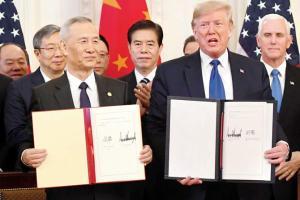Chinese officials say the consumer spending has increased showing success of China's efforts to rejig its economy from one based on exports to more reliant on consumer spending.

Chinese Vice Premier Liu He (left) and US President Donald Trump display the signed trade agreement between the US and China. Pic/AFP
Beijing: China's GDP grew by 6.1 per cent last year, the lowest in 29 years, the government said on Friday, as sluggish domestic demand and the bruising 18-month trade war with the US seriously impacted the world's second-largest economy. The new GDP data released by the National Bureau of Statistics (NBS) comes a day after China and the US signed a long-awaited phase one deal, marking a ceasefire in the 18-month trade war which saw the world's two largest economies slap 25 per cent tariffs on about half a trillion-dollar worth of each other's exports. China's economy grew by 6.1 per cent last year, its worst performance since 1990, but it remained above the psychologically important six per cent mark. The GDP growth remained well within the 6 to 6.5 target set by the government, the NBS said. However, significant from the Chinese government's perspective, the GDP expanded to USD 14.38 trillion from last year's USD 13.1 trillion. In 2018, China's economy sank to a 28-year low slowing down to 6.6 per cent year on year, lower than the 6.8-per cent growth registered in 2017 as it grappled with the continued slowdown amid the trade war with US and declining exports.
Facing growing risks and challenges at home and abroad, the overall performance of the national economy has been stable, the quality of development has been improving with major targets being met, laying a solid foundation for completing the building of a moderately prosperous society in all respects, Ning Jizhe, Director of the NBS said at a press conference. There is a sense of relief among the officials here as the official growth rate remained above the psychologically important 6 per cent as mandated by Chinese President Xi Jinping who in the past directed that GDP should not go down below six per cent, which could cause serious disruption to the world's second largest economy. Although the 6.1 per cent growth rate is China's weakest expansion in almost three decades - it is much higher than other leading economies. The US central bank, for example, has forecast that the American economy will grow by around 2.2 per cent this year. Chinese economy was hit hard by the US tariffs as a result of the trade war between the two countries. After signing the phase one deal on Wednesday, US President Donald Trump said 25 per cent tariff hike on USD 360 billion worth of Chinese products would continue until the phase-2 deal is worked out.
ADVERTISEMENT
"The phase one deal is only an interim agreement between China and the US. In fact, to push for negotiation in the next stage, the US will keep existing tariffs on imports from China unless the two countries manage to reach a phase two deal," said Alicia Garcia Herrero, chief Asia Pacific economist at Natixis. "In the bilateral evaluation and dispute resolution chapter, the agreement also makes it clear that, if the concerns cannot be resolved, the two parties hold the right to suspend an obligation, adopt a remedial measure, or in the worst case, withdraw from the agreement," he told the South China Morning Post. Despite falling to a new low since 1990, when political turmoil drove economic growth down to 3.9 per cent, the 6.1 per cent rate met the target range of between 6.0 per cent and 6.5 per cent set by the central government at the beginning of last year, but was below the market expectation of 6.2 per cent. The headline figure was in line with forecasts of the International Monetary Fund and the World Bank for China's economic growth this year, the Post report said.
Chinese officials say the consumer spending has increased showing success of China's efforts to rejig its economy from one based on exports to more reliant on consumer spending. According to the NBS data, China's per capita disposable income stood at 30,733 yuan (USD 4,461.95) in 2019, up 5.8 per cent year on year in real terms. Chinese per capita consumer spending increased by 5.5 per cent year on year in real terms to reach 21,559 yuan in 2019, the data said. By 2020, China aims to double the per capita income of its urban and rural residents from 2010 levels. China's value-added industrial output, an important economic indicator, expanded 5.7 per cent year on year in 2019, slowing from 6.2 per cent growth in 2018. The growth rate was higher than that in the first 11 months of 2019, the data said. In December alone, China's industrial output expanded 6.9 per cent year on year, up 0.7 percentage points from November, state-run Xinhua news agency quoted the data as saying. China's fixed-asset investment (FAI) increased 5.4 per cent year on year in 2019, 0.2 percentage points higher than the level recorded in the first 11 months.
Catch up on all the latest Crime, National, International and Hatke news here. Also download the new mid-day Android and iOS apps to get latest updates
This story has been sourced from a third party syndicated feed, agencies. Mid-day accepts no responsibility or liability for its dependability, trustworthiness, reliability and data of the text. Mid-day management/mid-day.com reserves the sole right to alter, delete or remove (without notice) the content in its absolute discretion for any reason whatsoever
 Subscribe today by clicking the link and stay updated with the latest news!" Click here!
Subscribe today by clicking the link and stay updated with the latest news!" Click here!







